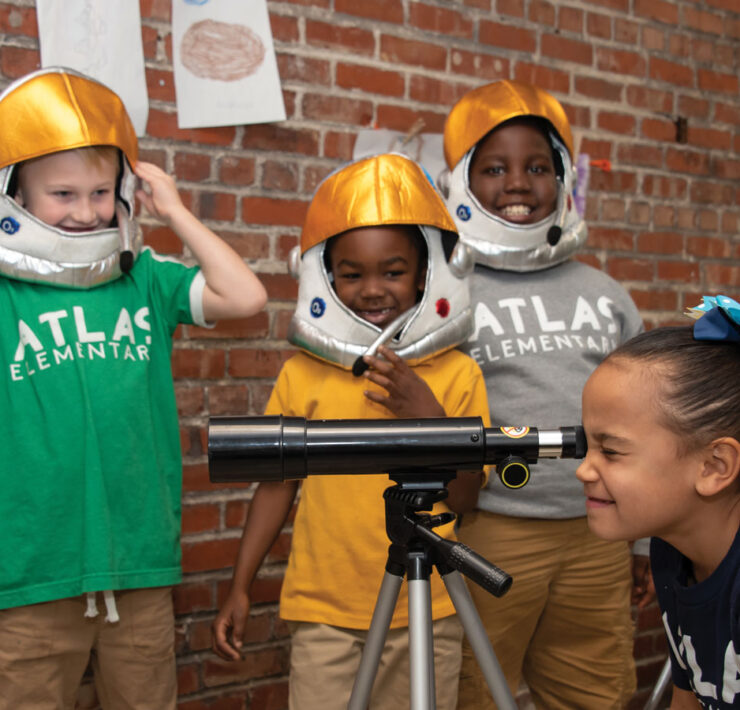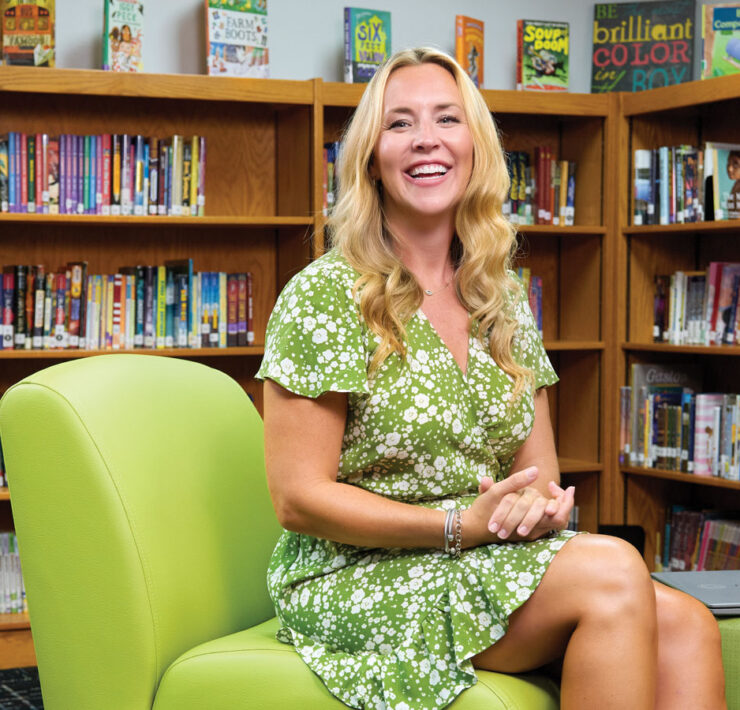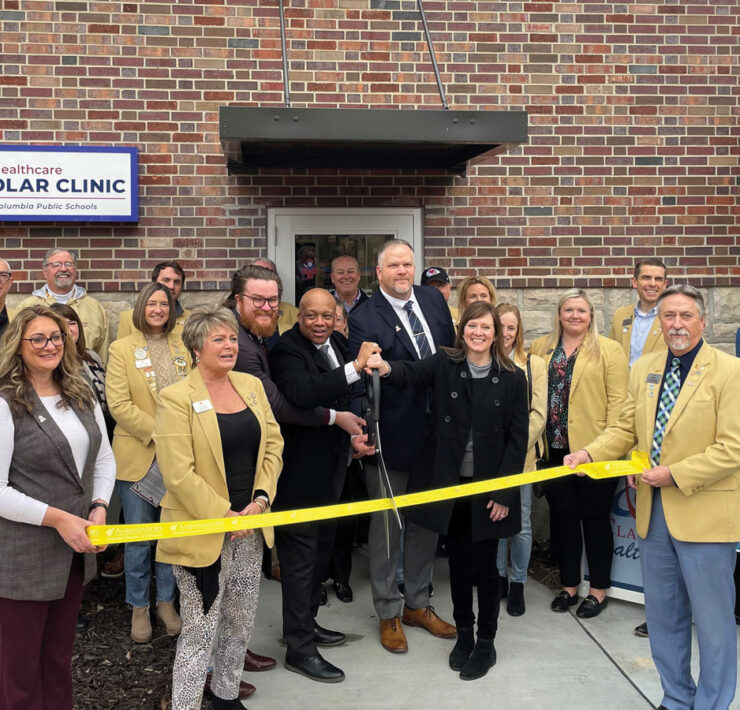Students Reap Dividends of Early College
- This story originally appeared in the September 2023 education issue of COMO Magazine.

CPS and MACC partnership puts students on the path to success.
Imagine a scenario where a high school student graduates from college before graduating from high school.
Thanks to the Early College program — a partnership between Columbia Public Schools and Moberly Area Community College — and a plethora of dual credit and advanced placement courses available at CPS, the graduated-college-before-graduated-high-school plot is not just wishful thinking. It has already happened.
Students must do the work of earning the credits. CPS pays for the books, tuition, and other fees at MACC from the average daily attendance funds the school district receives from the state for each student. Students take classes from a suite of courses, known as the CORE 42, that are transferable to any Missouri public college or university.
“They’re basically getting two years of college paid for,” says Aleesha Coke, director of MACC’s Columbia campus, and the primary advisor to Early College students.
Early College got started in the fall of 2020, despite the seismic impacts of the worldwide COVID pandemic.
“We decided how schedules would be built, the bus routes — all of that,” Coke recalls. “When COVID hit, all the preparation just kind of went out the window. But we made it work and our students were wonderful. We have very resilient students.” The first group of students were “barely on campus” because of remote learning.

“That’s doubly impressive,” Coke notes.
Now in its fourth year, the program has produced 68 CPS graduates who have already earned a two-year, associate degree along with a high school diploma. In at least one case, a student’s combined dual credit, advanced placement, and Early College credits also meant college graduation before high school graduation.
Dru Nash, the CPS advanced studies coordinator, is the first point of contact for students before they find their way to Coke’s office. Students must be extremely motivated, she says.
“There’s a lot on the students to do this,” Nash explains. “They’re navigating the two worlds — high school and college.” Nash says she and Coke, along with their staff and instructors, provide support to help the students be successful.
Coke and Nash, along with former CPS Superintendent Dr. Peter Stiepleman, MACC President Jeff Lashley, and others brainstormed how to launch an early college program in 2019 after Stiepleman returned from a Columbia Chamber of Commerce trip to Ann Arbor, Michigan, the previous spring.
That trip introduced Chamber visitors to Middle College, a partnership between Ann Arbor Public Schools and a community college, and it sparked what would become Early College for CPS and MACC. In COMO Magazine’s April 2020 feature on the new partnership, Stiepleman gushed about the possibilities and benefits.
“This could be an absolute game-changer in terms of eliminating two years of college debt, increasing the chances a kid will graduate a four-year institution, or be ready to go right into the workforce with their associate degree,” he said at the time.
Coke says Early College has met and exceeded everyone’s expectations. Nash agrees.
Younger siblings from families that have already had a student in the program are now participating, too.
“I think that’s a good marker of success, when you see families seeing value in it. That’s been a cool piece,” says Nash, whose career in education is in its 29th year.
Back in 2020, school officials expected around 50 students would take advantage of Early College. The final enrollment number was 155. The total for fall 2021 was 125 and 132 were enrolled in 2022. As the 2023-24 school year begins, 166 students are ready to begin splitting time between CPS and MACC for Early College 45 are expected to graduate high school in the spring. The program had 32 graduates in 2022 and 36 in 2021.
“They go to college all over the country,” Coke says, listing the University of Kansas, California, Florida State, and Mizzou as some of the locations where Early College grads have landed. High schoolers who begin Early College as seniors might continue with MACC for another year to earn their associate degree or go on to a four-year college with the transfer credit.
“They can go into a four-year college as a sophomore, basically,” Coke adds. A handful typically drops out of the program for various reasons.
Students who are accepted into Early College must meet a certain academic profile: a minimum grade-point average of 2.75, a qualifying ACT score, and a record of at least 90 percent attendance. They will take classes at MACC and earn 10 to 12 credit hours per semester while still progressing toward their diplomas and maintaining their status as high school students.
At this point, there is no cap on the number of students who can take advantage of Early College.
“They get the best of both worlds,” Lashley told COMO Magazine in 2020, noting that the CPS and MACC offered several services to help students be successful. “We’re also focusing on getting first-generation college students involved.”
Early College helps students who might not have their sights set on higher education become aware of how accessible and affordable college can be, he added.

Nash says the collaboration between CPS and MACC administrators and boards has been a key for creating a successful program that is unique and “always evolving.”
“Early College happens all over the nation. We definitely looked at how other districts structured everything,” she explains. “We wanted to see how it needs to work for Columbia Public School students.”
Nash continues, “I think one of the biggest things that has made this so successful is the community feedback. The support is amazing.”
Coke, a Columbia resident since 2004, says Early College is “the buzz of the town” and is strengthening MACC’s solid relationship with CPS. The college also benefits from the revenue Early College generates.
“It’s a good public relations builder for us and building the relationship with CPS was a big deal, too,” she adds.
She envisions expanding Early College to other Boone County school districts, and talks are already under way to partner with Hannibal Public Schools.
“They definitely want to model it off Columbia’s program,” Coke says.
Early College orientation takes place with information sessions in August. Nash encourages students to apply, go through the enrollment process, and see if Early College will be a fit.
“People are becoming more and more informed about what it entails and what it looks like,” she adds. “I just like to see my students and families make as informed decisions as possible.”
CPS already offers 30 dual credit classes and a host of advanced placement courses. Those options, along with Early College, will sometimes create the opportunity to earn a full college degree before or simultaneously as a high school diploma, Nash says.
Early College has also earned praise from Todd Martin, MACC’s vice president for instruction.
“We’re very pleased with what we’ve been able to do, to continue to grow,” Martin says. “We’re in the process of exploring ways to grow it even more.”

In addition to expanding Early College to other school districts, there’s also discussion about how part-time status might work. Up to now, students are encouraged to take 12 credit hours each semester. Offering part-time status might increase opportunities and access.
“I see a bright future for this partnership and I’m looking forward to seeing where it goes,” Martin adds.
Coke calls Early College “my baby,” pointing out that students can still participate in athletics, activities, and other functions of the high school experience.
“They’re still full-time students while they’re doing this,” she notes. “That can be a little bit overwhelming, especially if they’re involved in other activities.”
That’s even more reason to applaud Early College enrollees, Martin says.
“It’s remarkable how it works — the dedication of the students,” he adds. “That’s awesome. That makes me feel good about the future.”








